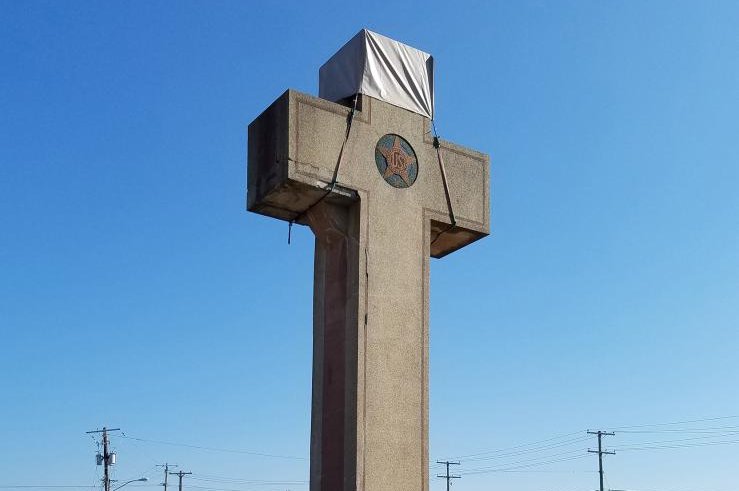The 40-foot Latin cross was erected in 1925 in Bladensburg, Md., to honor local soldiers who died in World War I. Photo by Rob Boston/American Humanist Association
Feb. 26 (UPI) -- The battle over a World War I monument that's nearly 100 years old in shape of a cross could allow the U.S. Supreme Court this week to settle longstanding questions in the First Amendment's Establishment Clause.
The court is scheduled to hear arguments Wednesday on whether the 40-foot Latin cross inside a busy traffic circle in Bladensburg, Md. -- erected in 1925 to honor local war dead -- is appropriate for government-owned land.
An American Legion post and others privately raised the funds for the memorial; local government provided the land for the passive symbol in the Washington, D.C., suburb.
The American Humanist Association, which sued in 2014 to have the cross reshaped or removed, won the biggest court decision to date when the Fourth Circuit Court of Appeals in Richmond, Va., ruled in its favor in 2017.
AHA executive director Roy Speckhardt said the cross -- even by the loosest definition -- resembles a religious symbol and violates the Constitution's Establishment Clause.
"There is a misconception that this is an attack on all religious symbols, as if we didn't want a cross to be used at a grave site in Arlington National Cemetery, for instance," Speckhardt told UPI. "This is not what this is about at all. The Bladensburg Cross is not a grave marker. No one is buried there.
"This is supposed to represent all veterans of all wars. A Christian cross, especially a Calvary Christian cross, which was intentionally put up to be, does not represent everyone."
Michael Carvin, who represents the American Legion, told National Public Radio that the cross actually "evokes the cemeteries in Europe that became a universally acknowledged symbol of World War I dead because of European graveyards" and does not have an implicit religious overtone.
Neal Katval, who is representing the Maryland National-Capital Park and Planning Commission, which took over the memorial in 1961, said the words at the base of the monument -- valor, endurance, courage, devotion -- make it clear that the monument is a war symbol, not a religious one.
The AHA has been joined in amicus briefs by several religious organizations, including the American Jewish Committee, which argued in a statement earlier this month that if the Supreme Court sides with the American Legion it would "give governments carte blanche to erect new crosses."
Alexandra McPhee of the Family Research Council told UPI that the efforts by AHA were just another attempt to use the unclear Establishment Clause to push religion out of the public square. The council filed an amicus brief on side of the American Legion.
McPhee said the Supreme Court could open the door for virtually any symbol that may resemble something connected to a religion to be attacked and removed.
"That will have a negative impact on all religions," McPhee said. "We got involved because the controversy surrounding this veterans memorial is what we see as representative of the controversy over the past 10 to 15 years of the role of religion in the public square."
The Supreme Court punted on the last chance it had to clear up an issue surrounding religious freedom. Last year the court ruled in favor of Colorado cake baker Jack Phillips, who argued that he should not be made to make a cake for a gay couple because of his religious beliefs.
The court ruled that the Colorado Civil Rights Commission failed to give Phillips a fair hearing while declining to rule on whether Phillips had the right to deny such services because of his sincerely held beliefs.
While this case is different in many aspects, it wanders into the murky Establishment Clause, where courts in the past have struggled to clearly define if such passive symbols actually endorse a particular religion over another.
McPhee said she hopes the Supreme Court will make a broader statement on the clause instead of the narrowly tailored decision that has marked recent court decisions.
"What we are hoping for is that this case take the opportunity to set the record straight on the Establishment Clause," McPhee said. "The Supreme Court itself has always been clear about protecting traditional practices that recognize the role religion plays in our society, even though it hasn't been clear on how to draw the boundaries. Faith is rooted in the foundation of this country. It was refuge for the persecuted religious minorities from overseas."
Speckhardt, who said he will attend Wednesday's arguments, said he would be happy with a narrowly written decision in AHA's favor, but believes the law and Constitution is on his side in any broader ruling.
"After all, we've brought a number of cases where there have been crosses on government land which we've won," he said. "Those cases have been brought to the federal court because there has been some lack of clarity to what the rules should be. I think if the Supreme Court was clearer about it, it could help everybody involved."















